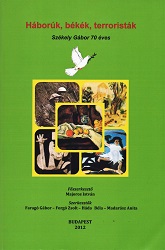
We kindly inform you that, as long as the subject affiliation of our 300.000+ articles is in progress, you might get unsufficient or no results on your third level or second level search. In this case, please broaden your search criteria.

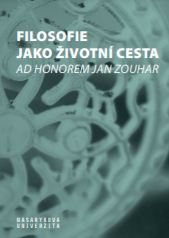
The collection of papers Philosophy as a Life Journey was published in honour of Jan Zouhar, a distinguished professor, an expert in the history of Czech philosophy and an organizer of university life. The volume begins with an interview in which Professor Zouhar outlines his philosophical creed. The core of the collection comprises six personal contributions (Laudationes) and sixteen original scientific works that focus on a wide range of issues related to philosophy, history, literature, language, ethnography and culture. The final part of the volume (Appendices) contains a brief curriculum vitae of Professor Zouhar and a selection of his works and photographs followed by a list of volume contributors.
More...
The text introduces Jan Zouhar as an important representative of contemporary Czech philosophy. It is an attempt to cover the breadth of his philosophical thinking, which extends from the historiography of Czech philosophy to some remarkable overlaps. For instance, we can mention the position of philosophy in the context of our spiritual culture, the place and role of tradition at present, and a reflection on the role that philosophy plays in human life.
More...
Unlike Martin Heidegger, who was always critical of Plato’s role in the history of philosophy, and Jan Patočka, who was more charitable but still had serious misgivings about Plato, Edmund Husserl saw Plato truly positively. However, his view resulted from the fact that he had simplified Plato’s theory substantially and adapted it to his own view of philosophy. According to Husserl, Plato was an inspirational figure as a founder of philosophical ‘theory of science’, and because he sought abstract knowledge of the Forms, he could serve as a useful contrast to the one-sided philosophy of modern empiricism. This paper attempts to present Husserl’s position in a greater detail and assess it.
More...
The Study Prometheus, for example loosely follows up the central theme of Hans Blumenberg’s theory of myth and mythology, the character of Prometheus and Promethean conceptions in scientific as well as imaginative literature (poetry and drama). The aim is not an elaborate reflection of all the variations on Promethean themes that were summarized in Blumenberg’s epochal book Work on Myth (1979). The author rather selects some themes from the works on the myth about Prometheus in Classical Greek literature (Hesiod, Aeschylus) and, at the turn of modernism, in German movement Sturm und Drang (Goethe). Most attention is paid to a fictional figure known as actio per distans (action at distance, with keeping a distance) and its variations from the distance between people and gods through the distance between people to the distance of an ageing poet from spirit of the age (Zeitgeist), to which he no longer belongs.
More...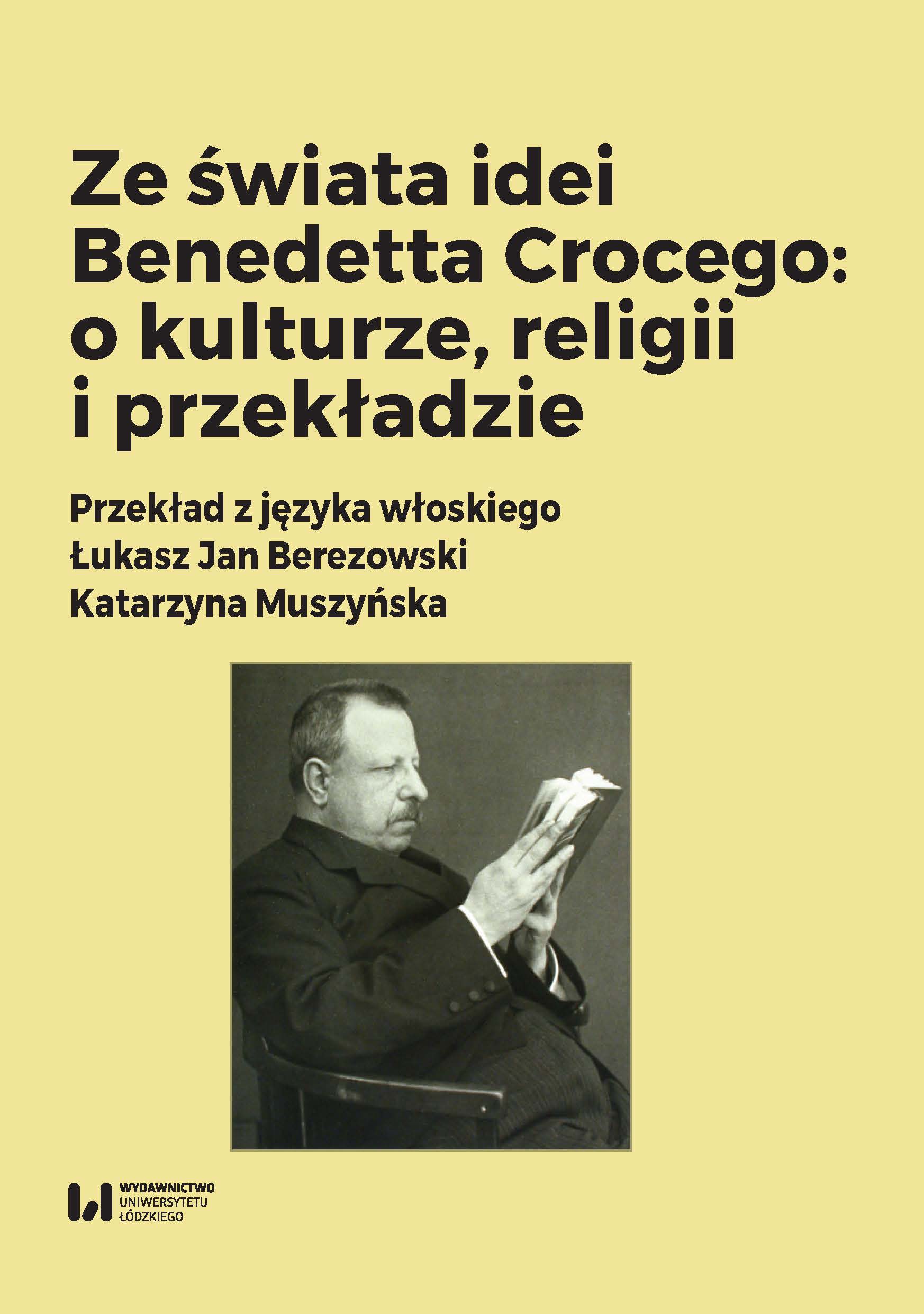
The original versions were primarily issued in "La Critica. Rivista di Letteratura, Storia e Filosofia", a journal edited by Benedetto Croce in the years 1903-1944. The presented work is accompanied by a historical and philological commentary of the editor as well as a list of printed references related to Croce (both source texts and critical editions available for Polish language).
More...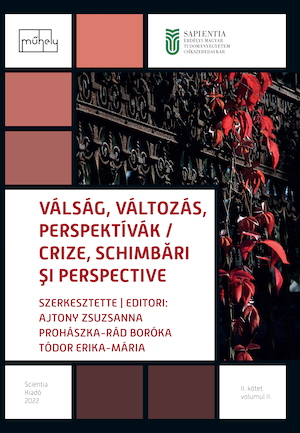
For Bergson, humour is a social phenomenon, and it needs artistic media to work well. Humour has a specific logic pointing beyond rationality. An epistemological investigation of laughter is theoretically required because the human ability of laughing – according to Bergson – is not a mere evolutionary reaction but a philosophical-psychological instinct, namely the ability for intuition of life. Within the confines of comedy, Bergson distinguishes several types of humour. He intends to emphasize that comedy stands on the boundary between life and art, and thus it trends to the universal. The philosophical relevance of humour reveals itself in being conducive to learning the technique of paying attention to life. The artist feels this human aim: the desire to contemplate ourselves free from external interests. Bergson calls this contemplation intuition. With this ability, one can turn to one’s own self. According to Bergson, this willingness proves the aesthetical ability of mankind, which has a subtle aim: to search for ourselves beyond our sense. In my paper, I would like to present the main elements of Bergson’s theory of laughter. Furthermore, I would like to emphasize that Bergson’s centenarian theory is still relevant.
More...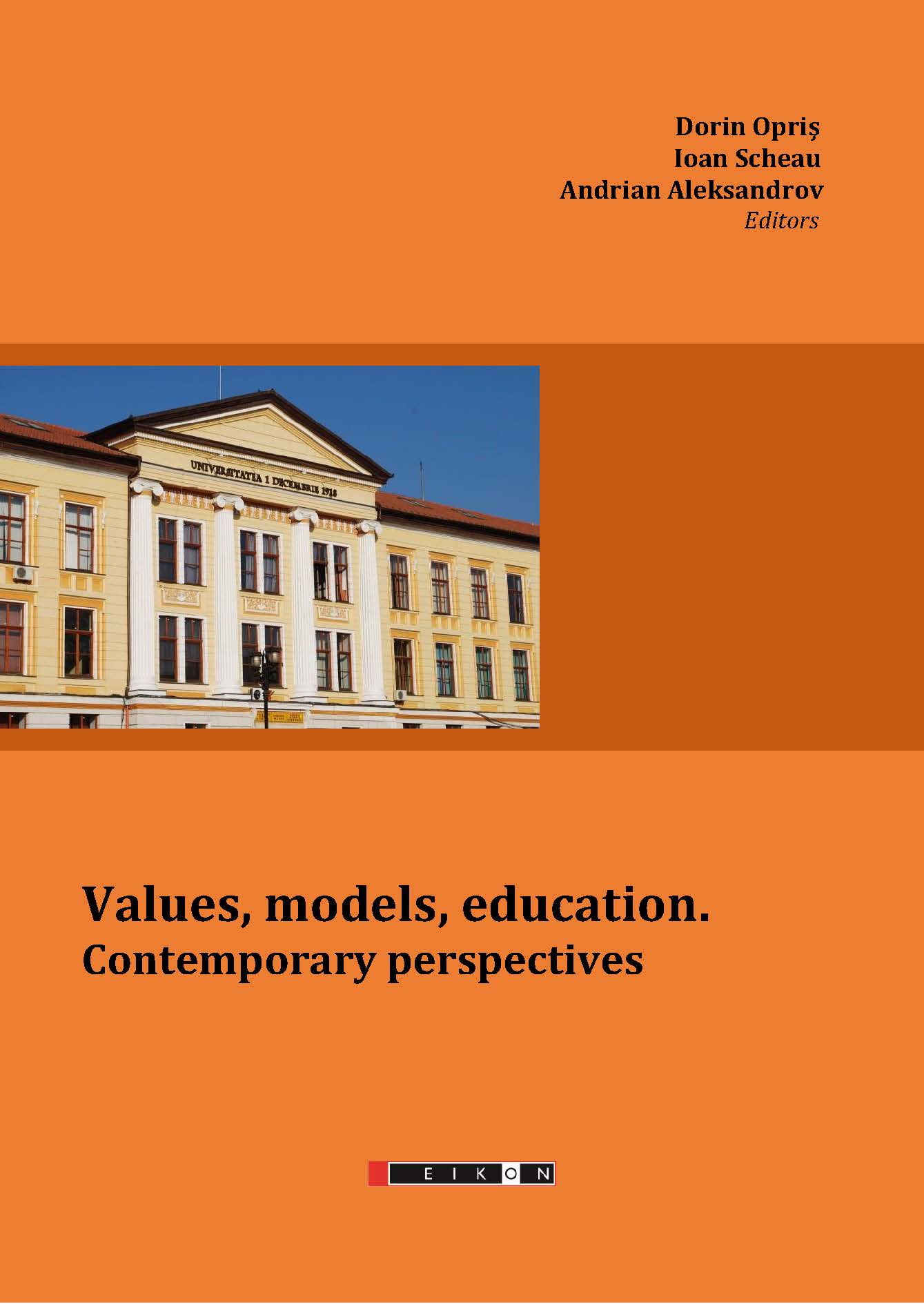
Life and death are fundamental antinomian concepts of human existence. Life as a process of becoming gives us the chance to realize ourselves personally and professionally. Man's attitude towards the value of life, in different historical periods, was different: for the ancient man, life is a complex process, which sums up contemplative and moral aspects, which would help him delimit truth from falsehood, value from non-value, etc.; for the medieval man, the moral life is in close correlation with the observance of church canons, intelligence being defined as the main instrument of morality; for the modern man, life holds supreme value; the postmodern man is confused and uncertain, discussing contradictory issues related to the meaning and value of life in the context of multiple overlapping crises (spiritual, moral, political, etc.). The issue of the value of human life becomes an object of study of bioethics starting from the second half of the XX century. Bioethics has always been focused on ethical-moral norms and values, human life representing the supreme moral value.
More...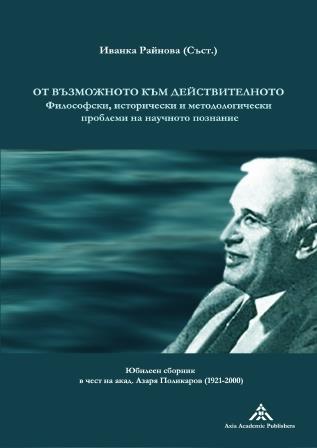
The main thesis of the author is that religion and science are the existential needs of the human spirit. But many see a contradiction between both. Where does it come from, and how can the original unity be restored? From the position of Hegel (Encyclopedia §1): “Philosophy and religion have as their subject the truth, and it is the truth in the highest sense of the word that God and He alone is truth." Further, both deal with the realm of the finite, nature and the human spirit, and their relationship to each other and to God as their truth. Science and religion have different fields of application, but they sort of illuminate the same objective reality from different points of view. Thus, they complement each other, they are not contradictory in themselves, but only in the scattered mind of the pragmatist, atheist thinkers, or the ignorance of the naive realist. And since man is created ontologically unified, he must find truth, peace and faith in the unity of his Self, which will lead him along the Path of Truth and Life. Religion and science can relate to each other as religious and secular, church and state, soul and body. The questions of creation and evolution are much more complex, and here are at least ten basic concepts between creationism and the materialist realism. More important is not whether there are developments and degrees of perfection in the world, but the question is: How has been constructed their determination and what are the causal links and interactions? All these problems are unsolvable without mastering and using the dialectical logic that began with Plato, but was created by Hegel and successfully interpreted and applied by Whitehead.
More...
Can scientific knowledge help us to save humanity? In her article, Batuleva shows that for Radoslav Tsanoff scientific knowledge is an undeniable value, an unconditional good, and yet we cannot fully trust it without a preliminary clarification of the question of how knowledge relates to other values, what is its effect on individual human experience on the one hand, and on the social existence on the other. Batuleva displays how Tsanoff's theory of values serves as a foundation and a link between the ethical, scientific and socio-political discourses. The original optics he has chosen, aims to inscribe moral imperatives in scientific, economic and political relations. This leads him to build a new scale of values, because without a "vital moral principle", any economic or political reform would lose its positive charge.
More...
Right from its beginning in 1660 the Royal Society of London embarked on a program of research in natural history. It inevitably included the Ottoman empire and was mostly organized by the first secretary of the Society, Henry Oldenburg, who took care of the business in those first formative years of the scientific academy. His correspondents were able to provide information from various parts of the Empire, but also from neighboring countries and regions. In this process a special role played the so-called questionnaires for natural history, which were designed by the Society’s Fellows and shaped not simply the research but also the correspondence itself.
More...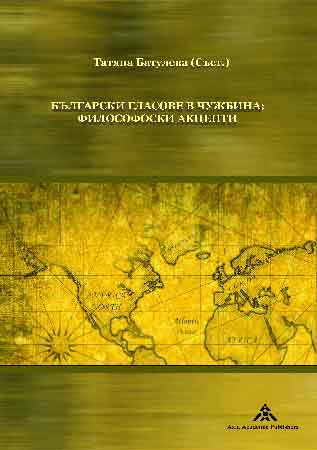
The work is centered around the views of Dr. Petar Beron – an "emblematic" person for the so called "Bulgarian Revival". He is the first Bulgarian encyclopedist and author of the first Bulgarian textbook for modern, secular education. Beron spent most of his life in Heidelberg, Munich, Paris, Berlin, London, Athens and Vienna. The text analyses his original system for explaining the world, set out in his greatest work, published in 8 volumes under the general title "Panepistemia". In this case, the object of analysis are the philosophical views of Beron, presented in the work "Slavic Philosophy", published in 1855 in German in Prague. His name is an emblem and a metaphor of the national culture and Bulgarian identity of this period.
More...
The article is devoted to the intense literary and public activities of the Bulgarian philosopher Yanko Yanev in Germany from the mid-1930s and until his death in 1944. Yanev was educated in Germany and defended a doctoral thesis under the supervision of Heinrich Rickert. He is the author of numerous important studies on Nietzsche, Hegel, Goethe, Hölderlin, Novalis, Schopenhauer, etc. The article is focused on Yanev’s metaphysi-cal inquiries, which brought him to perceive a kinship between the Balkans and Germany. The author discusses Yanev’s rejection of the claims regarding the Slavic nature of Balkan people, claims he considered a Russian insinuation. Also commented on is his view that the Balkans is a construct, in the creation of which this Bulgarian thinker invested his romantic attitudes and imagination.
More...
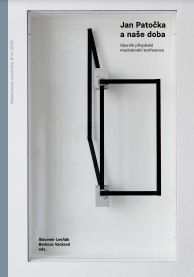
Jan Zouhar describes the development of Patočka’s stance on Masaryk and his philosophy in his paper “Jan Patočka and T. G. Masaryk”. The author shows the contradictions in Masaryk’s philosophy discovered by Patočka. In particular, he presents Masaryk’s attempt for scientific objectivism together with his conviction of the personal governance of the world by Providence. He also deals with Patočka’s criticism of Masaryk’s dissociation from Cartesian rationalism and his transition to Comte’s principals of the philosophy of history. The author finds the principal divergence between Patočka and Masaryk in the issue of the construction of Czech history and its evaluation (the climaxes of Czech history), as well as in the search for the sources of crises and their solutions. Petr Jemelka focuses on the beginnings of Patočka’s philosophical career in the first Czech philosophical journal Česká mysl (The Czech mind) in his paper “Jan Patočka and Česká Mysl”. Jemelka’s text is based on the detailed analysis of Patočka’s articles and reviews published in the journal since 1928. He also notes the problem of the critical acceptance of phenomenology in Czech philosophy. Michal Černý’s paper: “Caring for the soul as the basis of phenomenological pedagogy in the context of educational technologies” deals with phenomenological concepts of pedagogy by Patočka and Fink in connection to the new technological alternatives in education. The author confronts Patočka’s pedagogical style and Fink’s philosophy of education with the new forms and methods of education such as self-organised learning, connectivism etc. Lucie Divišová describes in her paper: “The French World of Jan Patočka” Jan Patočka’s French experience during his studies at Sorbonne (and lectures of Edmund Husserl) through his reflections on French philosophy (especially existentialism) to the interest of the French in Patočka as a philosopher and a dissident. Lucie Divišová maps out those Patočka’s themes that contribute to French thinking in the (not only contemporary) “European community of (sympathetically) shaken” In “Patočka’s Concept of Responsibility as a Non-orgiastic Overcoming of Everydayness” bases Dalibor Hejna his analysis on a distinction made by the Czech philosopher Jan Patočka between demonic, orgiastic experience of the sacral and responsibility connected to the philosophical questioning as the two forms of overcoming servitude. Dušan Hruška interprets Patočka’s idea of negative Platonism from the 1950s as a reconstruction of Greek metaphysics with the far-reaching theoretical and practical consequences. He points out Patočka’s non-traditional perception of connections among Jewish, Greek and Christian origins of Europe as well as Patočka’s effort for inner pluralism of modern discursive universe instead of unifying (metaphysically well-founded) alternative. The author completes the paper by pointing out the hidden metaphysical themes of the philosophical problem of freedom in a confrontation with Nietzsche’s and Heidegger’s opinions on these issues. Slavomír Lesňák analyses the possibilities of Patočka’s ethical ideal of combatants and ascetics in his paper called: “Solidarity of the Shaken in Times of Ecological Crisis.” He compares it to the ideal of the temporary autonomous zone of Hakim Bey. He concludes that Patočka’s solidarity of the shaken by an ecological crisis is intensified by the crisis’ increased severity. The author believes that the applicability of Patočka’s ethical concept of solidarity of the shaken will be more topical during an ecological catastrophe. Katarína Mayer confronts Patočka’s and Rorty’s approach to the question of the timeless ideal of human freedom in her paper “Patočka and Rorty (Few Comments on the Question of Freedom).” Mayer finds differences in notions of these authors concerning the concept of freedom as a random possibility, which were refused by Patočka. On contrary, as the author claims, the freedom is underpinned on history. The historical context reveals meaningfulness of freedom and acting in present. Radovan Rybář attempts to define Patočka as the Socratic figure in his paper: “Timelessness and Limitlessness of Jan Patočka’s Ideas”. The author interprets Patocka’s understanding of phenomenology by drawing inspiration from content analyses of selected texts on Patočka. Patočka’s caring for soul is noted by the author not only in philosophy but in politics as well. In the context of the European crisis of meaning (in modern times), he concludes that man enters history only by living in defiance to any present arbitrarily ruling power. Róbert Stojka analyses in his paper “The Concept of History and Historicity in Patočka’s Philosophy” the main line of Patočka’s philosophy of history – especially the relationship of man and history and historicity. According to the author the principle on which Patočka introduces his periodicity of history is the rise from decadence. Patočka’s idea of caring for soul that aided to the forming of the spiritual European man as well as Europe as a spiritual structure is a part of his understaning of history. According to Radim Šíp, Patočka’s philosophy of history and his concept of European time have limits, which are based on the lack of reflection of the neo-Hellenistic Enlightenment myth. As a consequence of this is not only Patočka’s loss of sense of reality when constituting phenomenological philosophy of history, but also a problem with distinguishing between formulating the ideal of freedom, responsibility and democracy and their actual fulfilment. Serious shortcomings, emerging from applying this approach that Radim Šíp calls „nostalgic romanticism”, also manifested in philosophy of education of Patočka’s follower R. Palouš. Radim Štěrba attempts to define Patočka’s contribution to the interpretation of the pedagogical legacy of Comenius in the context of the contemporary theory of education in his paper: “To Patočka’s Reflection of Pedagogical Ideas by J. A. Comenius”. He analyses pivotal Patočka’s Comenius-related texts and finds the problems both Comenius and Patočka faced with implementing the concept of the openness of soul. He presents the necessity of an authentic conversion to the open soul, deep inner transformation towards true humanity, which might be one of the few ways how to escape out of the crisis of contemporary society. The paper: “At Home? Phenomenology, Jan Patočka and the Meaning of Home” written by Barbora Vacková searches for phenomenological inspiration for Social science research of the meaning (and nature) of home in Jan Patočka’s work. The author uses Patočka’s perspective, as presented in his text “Prostor a jeho problematika (Space and its issues)” written in 1961 (however the first print was in 1985), while interpreting the empirical data gathered from the research project focused on making home more meaningful construction and experiencing it. The author considers in this adjusted phenomenological context the meaning of concepts of home and homeland for forming a relationship with “Others” and cohabitation with them. Erika Vonková describes in her paper “Jan Patočka as a Guide on the Journey to the Underworld” Jan Patočka as a possible guide from the world of shadows to the real world. The fate of Jan Patočka’s spiritual man is to live in a community and as such is of the opinion that he cannot resign, must abandon fear and become the man of politics. Such man in demonstrative and purposeful fashion casts the result of his own restless philosophical spirit in the face of his community – indeterminate reality. The political task of spiritual man is to destroy the image of the complete and known world of his fellow citizens and by doing so help them rebuilt it.
More...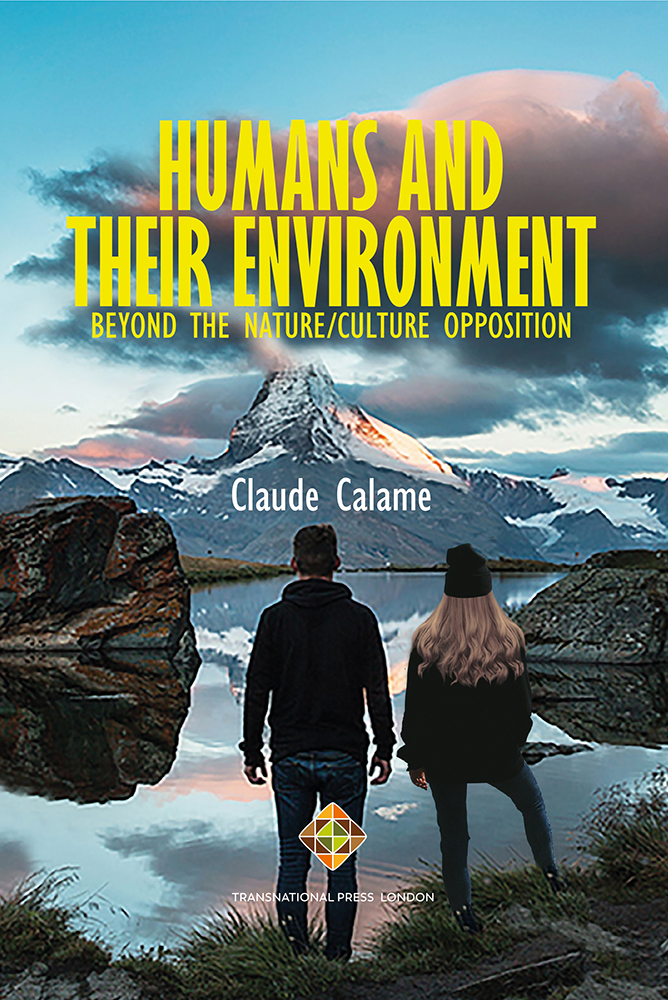
The modern concept of “nature” appeared during the 17th Century: nature as a mechanical object to be submitted to reason man. A long tradition refers to the concept of nature in the Greek phusis. It is referring to a dynamic process that engages in criticizing the modern paradigm of nature as opposed to culture.As it is, the principle of the domination and exploitation by humans of what we consider as nature is at the heart of the ideological, economic and financial models imposed by neoliberal capitalism. Based on the objective of growth, this model shapes and destroys human communities as well as the environment on which they rely and sustain.The climatic urgency as well as the limited capacity of the resources of the earth, require a transition towards an ecosocialism for another world. The anthropological confrontation with the Greek phusis invites to a break with capitalism based on a large scale and speedy use of technologies and with the only objective of financial gain. The result has been destructive productivism. Instead, we have to take into account the complexity of and interactions between human societies and their technical practices in their environment. The survival of one or the other is at stake. In sum, nature is culture.
More...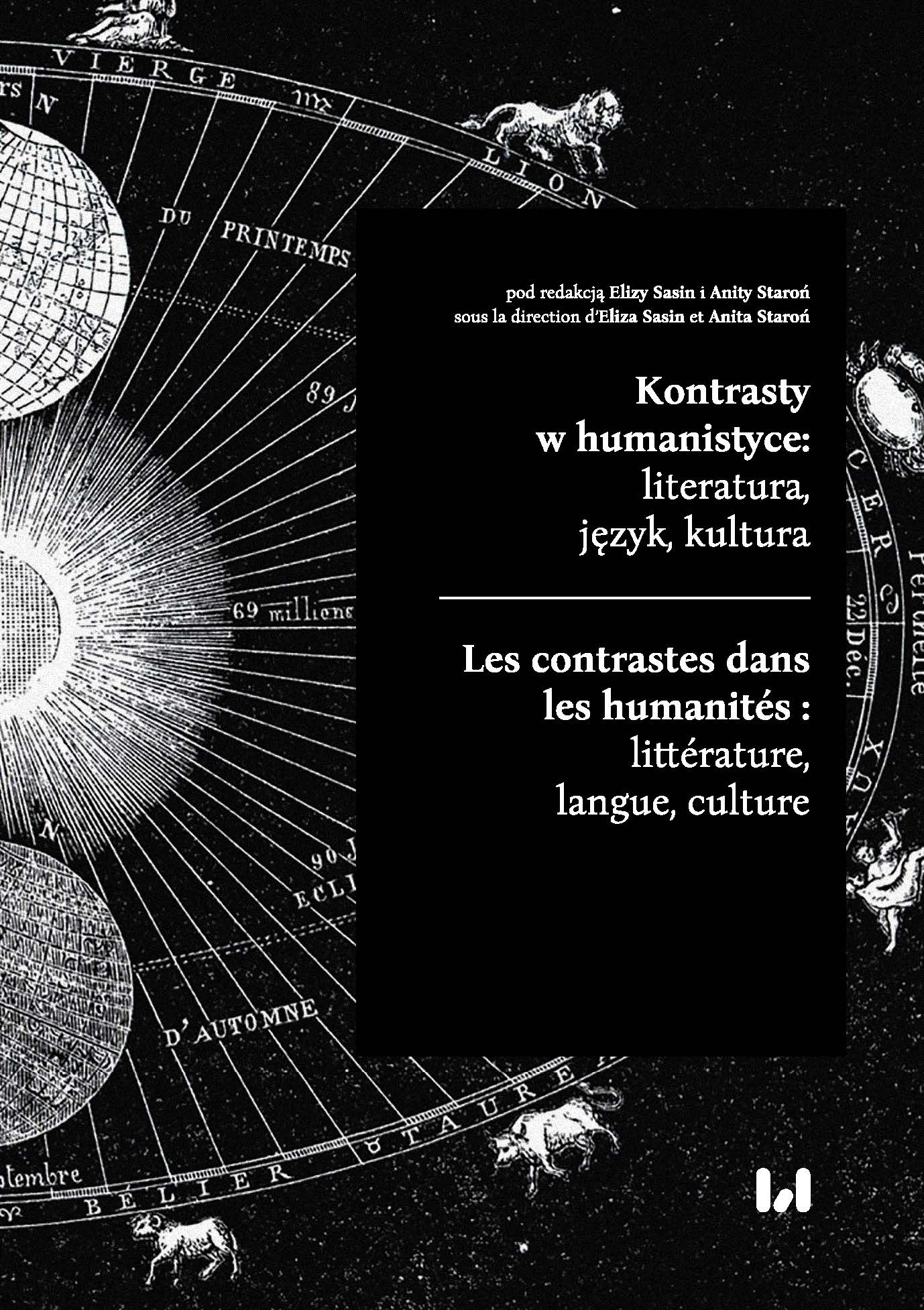
The present paper analyses the concept of the performativity of human language in the philosophical writings by Étienne Bonnot de Condillac and Jean-Jacques Rousseau. The first part of the text is devoted to the idea of langage d’action and its significance for Condillac‘s epistemology and theory of language; whereas the social and political functions of human speech, presented in the works of Jean Jacques Rousseau, are interpreted in the second part of the paper. Ultimately, it seems that for both Condillac and Rousseau human language is not just a mere thinking tool, but also a way of changing and improving our reality.
More...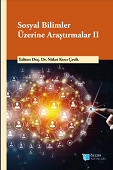
The problem of what philosophy is for or what its function is, is as important a problem as other major philosophical problems in the history of philosophy. Also, it differs positively from them in that it has some practical consequences. Traditionally, we see that philosophy is divided into two functions: philosophy as a theory of knowledge and philosophy as a social theory. These instrumentalist approaches argue that philosophy can have a direct impact on the world by carrying out missions such as grounding knowledge and bringing social change. On the other hand, there is an alternative approach that argues that philosophy should not be considered as a discipline that needs to be thought of in terms of its benefits it brings about. According to this essentialist approach, we should think of philosophy as a personal pursuit, a passion pursued in a way that is seperate from practical concerns. To see which of these approaches better reflects the nature of philosophy, it would be appropriate to look at the way it is currently applied and whether it can fulfill the traditional tasks assigned to it. This will show us that the essentialist approach is more preferable in the context of the problem of function than the instrumentalist approach.
More...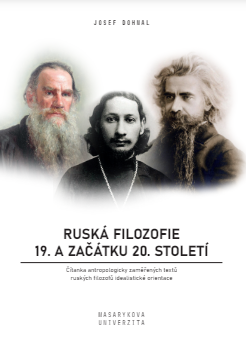
Противление признанию имен субстанциальными или эссенциальными формами личности нередко бывает движимо то сознательным, то полусознательным намерением отстоять свободу личности: эссенциальность имен, как думают, ведет за собой детерминизм и фатализм. Побуждение доброе, но некстати. Определенность внутреннего ритма, который утверждается за каждым именем, есть в такой же мере отрицание нравственной свободы, как и весь физический и психический склад, сообщаемый личности расою и народом, к которым она принадлежит. Несомненно, африканская кровь ускоряет душевные реакции и повышает яркость чувств, по крайней мере, свойственных данному лицу; но, как следует отсюда отрицание нравственной свободы? Пойдем далее; наследственный алкоголизм, как и наследственная музыкальность, сообщают личности определенные предрасположения и склонности. Однако, нравственная ценность личности ими ничуть не предопределяется; да не предопределяются и самые поступки, хотя заранее известно, что, каковы бы они ни оказались, при внимательном разборе их можно будет открыть в них и характерную наследственность данного лица. Преступный идиот и блаженный юродивец – эти два полюса нравственных оценок, в смысле наследственности, может быть, плоды одного родового дерева. Любой фактор, определяющий строение личности, ее склонности, ее возможности, ее внутренний темп и ритм, должен натолкнуться как раз на те же трудности, что и имя: тем, кто свободу духовного самоопределения смешивает с хаотическим произволом, всякая определенность личностного строения, что бы ни было ее причиною, оценивается как ущерб свободе и источник фатализма. Но не наше здесь дело обсуждать проблему свободы, и вполне довлеет, коль скоро показано, что имя – помеха свободе не более всякого другого личностного формфактора; с нас достаточно и доказательства, что не от имени падает свобода, если она вообще падает от определенности личностной структуры.
More...
The book brings together seven studies, which analyses some of the main discussions in Bulgarian philosophy, and offers also philosophical portraits of contemporary Bulgarian scholars of different generations: Nikolay Raynov, Azarya Polikarov, Julia Kristeva, Rosen Stupoff and Hristo Stoev. As in her previous books on Contemporary Western Philosophy, Yvanka Raynova uses here the approach of comparative and translative hermeneutics. This allows her to prove two main theses. Firstly, unlike some authors who consider Bulgarian philosophy and culture to be characterized by a lack of tradition, she maintains that tradition does exist, but that it is marked by three historical ruptures: The fall of Bulgaria under Ottoman domination in 1396, the gradual decapitation of philosophical and cultural pluralism after 1945, and the downfall of Marxism following the collapse of "real socialism" after 1990. Second, Raynova opposes the view that there were only "minor devia-tions" from Marxism-Leninism in Bulgarian philosophy during socialism, showing that a number of Bulgarian philosophers not only resisted the dom-inant ideological discourse, but also addressed serious issues, entering into discussion with the leading Western scholars of the time.
More...